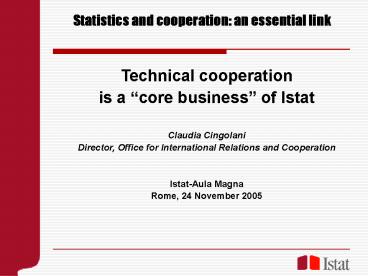Statistics and cooperation: an essential link - PowerPoint PPT Presentation
1 / 10
Title:
Statistics and cooperation: an essential link
Description:
1992: creation of a technical unit for cooperation within the Directorate General ... Technical cooperation is an opportunity for the professional growth of ... – PowerPoint PPT presentation
Number of Views:41
Avg rating:3.0/5.0
Title: Statistics and cooperation: an essential link
1
Statistics and cooperation an essential link
Technical cooperation is a core business of
Istat Claudia Cingolani Director, Office for
International Relations and Cooperation Istat-Au
la Magna Rome, 24 November 2005
2
The development of technical cooperation in Istat
- Main steps
- 1992 creation of a technical unit for
cooperation within the Directorate General - 1996 participation in the European CESD network
and framework agreement with Cesd-Rome - 2004 decision of the Council of Istat on
cooperation - as a strategic goal
- 2004 set up of the Office for international
relations and cooperation within the Presidency
3
Strategic goals of cooperation
- Contribute to building up of national statistical
systems - and to promoting the knowledge and the
application of standards at international level - Strengthen the international role of Istat in its
sectors - of excellence
- Participate more actively in technical contexts
of international development policies - Step up relations with national institutions for
the formulation and implementation of development
cooperation policies
4
Criteria in the selection of programmes
- Geographical areas
- compliance with political strategies of
institutional partners - experience gained in the countries
- Thematic fields
- acknowledged competence in the specific matters
- availability of high-quality and professional
resources
5
Sources of financing
- Italian Government through ad-hoc agreements for
complex projects - European Union through the participation,
individually or in consortium, in tenders (Cards,
Tacis, Phare, Medstat programmes) - International organisations (IMF, United Nations,
World Bank etc.) for specific projects - Other external sources
- Istat
6
Activities
- Technical assistance
- Tools
- Training
- Study visits
- Seminars, workshops and conferences
7
Geographical areas of cooperation
Albania, Bosnia-Herzegovina, Serbia and
Montenegro, Kosovo, Macedonia (FYROM)
Hungary, Poland, Romania, Latvia, Lithuania
Russia, Moldova, Ukraine, Azerbaijan,
Kazakhstan, Kyrgyzstan, Uzbekistan, Armenia,
Georgia
Algeria Tunisia Morocco Egypt Syria
Jordan Palestine Lebanon Israel Turkey Malta
Cyprus
China
Chile, Argentina, Uruguay, Andean Pact countries
Mozambique, Cape Verde, Nigeria
8
Fields of activity
ResearchDevelopment
Service statistics
Prices
Agriculture censuses
Business statistics
Business registers
Households consumption
Population and housing censuses
Institutional building
Agriculture statistics
Quality
National accounts
Dissemination and communication
Environment statistics
Statistical law
Non-observed economy
9
The challenges of cooperation for Istat
- Maintain the balance between demand and supply
- Develop within Istat a culture of cooperation
- and the required professionalism
- Foster full collaboration with the partner
country and sharing of choices and of expected
results - Improve managerial capacity and internal
instruments for financial and administrative
management of projects
10
Conclusions
- Technical cooperation in Istat is an
institutional activity and is integral part of
its planning - Participation of Istat in national and
international programmes for development
cooperation is reinforced and strengthened - Thematic fields and geographical areas respond to
technical and political evaluation criteria - Technical cooperation is an opportunity for the
professional growth of Istat staff
Statistics and cooperation an essential
link Claudia Cingolani, 24 November 2005

